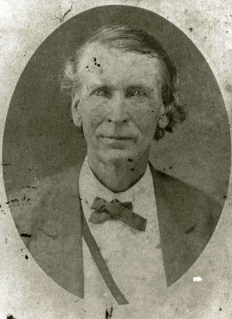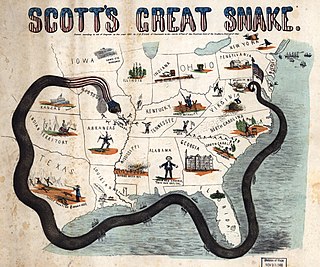
The Confederate States Army (C.S.A.) was the military land force of the Confederate States of America (Confederacy) during the American Civil War (1861–1865), fighting against the United States forces. On February 28, 1861, the Provisional Confederate Congress established a provisional volunteer army and gave control over military operations and authority for mustering state forces and volunteers to the newly chosen Confederate president, Jefferson Davis. Davis was a graduate of the U.S. Military Academy, and colonel of a volunteer regiment during the Mexican–American War. He had also been a United States Senator from Mississippi and U.S. Secretary of War under President Franklin Pierce. On March 1, 1861, on behalf of the Confederate government, Davis assumed control of the military situation at Charleston, South Carolina, where South Carolina state militia besieged Fort Sumter in Charleston harbor, held by a small U.S. Army garrison. By March 1861, the Provisional Confederate Congress expanded the provisional forces and established a more permanent Confederate States Army.

Harris Flanagin was an American politician who served as the 7th Governor of Arkansas from 1862 to 1864. Prior to this he served as an officer of the Confederate States Army who commanded an Arkansas mounted rifle regiment in the Western Theater of the American Civil War.

Henry Toole Clark was the 36th Governor of the U.S. state of North Carolina from 1861 to 1862 during the American Civil War.

Thomas Howell Cobb was an American political figure. A southern Democrat, Cobb was a five-term member of the United States House of Representatives and Speaker of the House from 1849 to 1851. He also served as the 40th Governor of Georgia (1851–1853) and as a Secretary of the Treasury under President James Buchanan (1857–1860).

The United States military ration refers to various preparations and packages of food provided to feed members of the armed forces. U.S. military rations are often made for quick distribution, preparation, and eating in the field and tend to have long storage times in adverse conditions due to being thickly packaged and/or shelf-stable. The current ration is the Meal, Ready-to-Eat (MRE).

Jesse Lee Reno was a career United States Army officer who served in the Mexican–American War, in the Utah War, on the western frontier, and as a Union General during the American Civil War. Known as a "soldier's soldier" who fought alongside his men, he was killed while commanding a corps at Fox's Gap during the Battle of South Mountain. Reno, Nevada; Reno County, Kansas; El Reno, Oklahoma; Reno, Pennsylvania; Fort Reno (Oklahoma); and Fort Reno Park in Washington, D.C. were named after him.

Thomas Edwin Greenfield Ransom was a surveyor, civil engineer, real estate speculator, and a general in the Union Army during the American Civil War.

Florida had joined the Confederate States of America in advance of the Civil War, as the third of the original seven states to secede from the Union, following Lincoln's 1860 election. With the smallest population, nearly half of them slaves, Florida only sent 15,000 troops to the Confederate States Army. Its chief importance was in food-supply to the south and support for blockade-runners along its long coastline full of inlets that were hard to patrol.

The State of Alabama was central to the Civil War, with the secession convention at Montgomery, birthplace of the Confederacy, inviting other states to form a Southern Republic, during January–March 1861, and develop constitutions to legally run their own affairs. The 1861 Alabama Constitution granted citizenship to current U.S. residents, but prohibited import duties (tariffs) on foreign goods, limited a standing military, and as a final issue, opposed emancipation by any nation, but urged protection of African slaves, with trial by jury, and reserved the power to regulate or prohibit the African slave trade. The secession convention invited all slaveholding states to secede, but only 7 Cotton States of the Lower South formed the Confederacy with Alabama, while the majority of slave states were in the Union and voted to make U.S. slavery permanent by passing the Corwin Amendment, signed by President Buchanan and backed by President Lincoln on March 4, 1861.

Georgia was one of the original seven slave states that formed the Confederate States of America in February 1861, triggering the U.S. Civil War. The state governor, Democrat Joseph E. Brown, wanted locally raised troops to be used only for the defence of Georgia, in defiance of Confederate president Jefferson Davis, who wanted to deploy them on other battlefronts. When the Union blockade prevented Georgia from exporting its plentiful cotton in exchange for key imports, Brown ordered farmers to grow food instead, but the breakdown of transport systems led to desperate shortages.

Alpheus Baker was a brigadier general in the Confederate States Army during the American Civil War.

Foods of the American Civil War were the provisions during the American Civil War with which both the Union and Confederate armies struggled to keep their soldiers provisioned adequately.

Cullen Andrews Battle was an American attorney, farmer, politician, and general in the Confederate States Army during the American Civil War, who continued to fight Congressional Reconstruction after the war in Alabama then North Carolina.
William Henry Tibbs was a Tennessee attorney and politician who served in the Confederate States Congress during the American Civil War. He was noted as a firebrand States' Rights advocate and Southern secessionist as well as being the last surviving member of the Confederate Congress till his passing in 1906.

Confederate Memorial Park is an Alabama State Park located in Mountain Creek, in rural Chilton County, Alabama. Its address is 437 County Road 63, Marbury, Alabama 36051. It is sometimes found with the same address in Verbena, Alabama 36091.

The 9th Arkansas Infantry was a Confederate Army infantry regiment during the American Civil War. It served throughout the war in the western theater, seeing action in the Vicksburg, Tennessee and Georgia campaigns. Following its depletion in numbers the regiment was consolidated several times with other Arkansas regiments, finally merging in 1865 into the 1st Arkansas Consolidated Mounted Rifles.
The 2nd Arkansas Mounted Rifles (1861–1865) was a Confederate Army infantry regiment that served during the American Civil War. Raised in 1861, the regiment consisted of nine companies, which were drawn from various counties in Arkansas. Throughout the course of the war, the 2nd Arkansas Mounted Rifles fought in a number of battles, including those at Wilson's Creek and Pea Ridge, and participated in a number of campaigns such as Tullahoma, Atlanta and the Carolinas. The regiment's final battle came at Bentonville in March 1865 after which its remaining personnel were consolidated into the 1st Arkansas Consolidated Mounted Rifles.
Jeptha Vining Harris was a brigadier general and later, after a year in private life, a colonel in the Mississippi militia, who fought in conjunction with the Confederate States Army in Mississippi during the American Civil War. His militia brigade served at Vicksburg, Mississippi during the Siege of Vicksburg. Harris and the brigade were part of the Confederate army surrendered to Union Army forces under then Major General Ulysses S. Grant on July 4, 1863. After being exchanged in July and mustered out in August, 1863, Harris returned to civilian life. On August 26, 1864, Harris was commissioned as a colonel of militia and given command of forces at Macon, Mississippi.

Ira Roe Foster was born along the Tyger River, in Spartanburg County, South Carolina. He was a teacher, medical doctor, attorney, soldier, businessman, and politician. During the 1840s, Foster served as brigadier general in the Georgia Militia. With the outbreak of the American Civil War, he was appointed Quartermaster General of the state of Georgia, a position he continued to hold after the war's end. He remained active in Georgia state politics into the Reconstruction period. Foster was also elected first mayor of Eastman, Georgia. He served in the Georgia House of Representatives, and was elected to the state senates of both Georgia and Alabama.
The American Civil War bibliography comprises books that deal in large part with the American Civil War. There are over 60,000 books on the war, with more appearing each month. There is no complete bibliography to the war; the largest guide to books is over 40 years old and lists over 6,000 titles selected by leading scholars. The largest guides to the historiography annotates over a thousand titles.


















